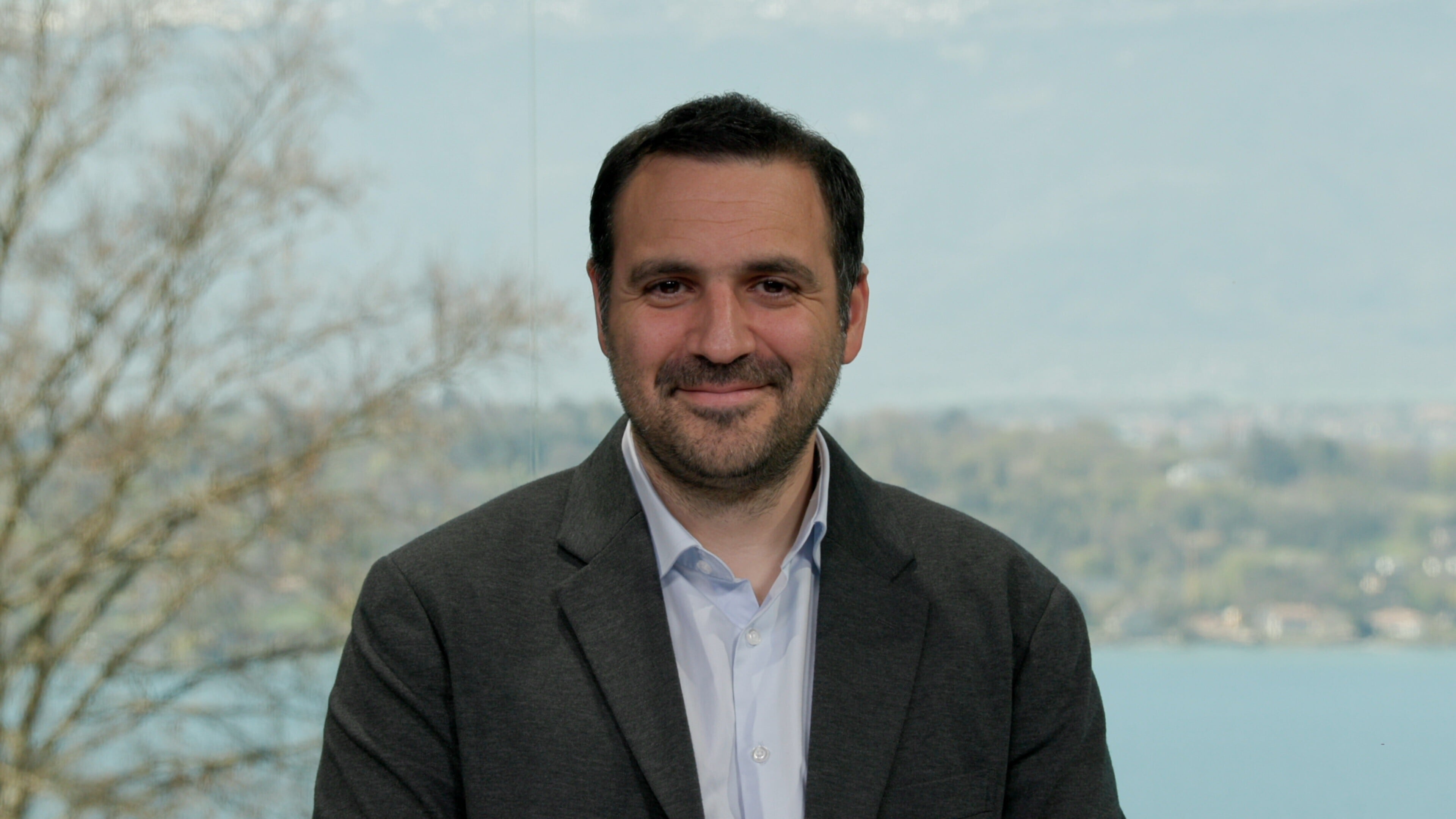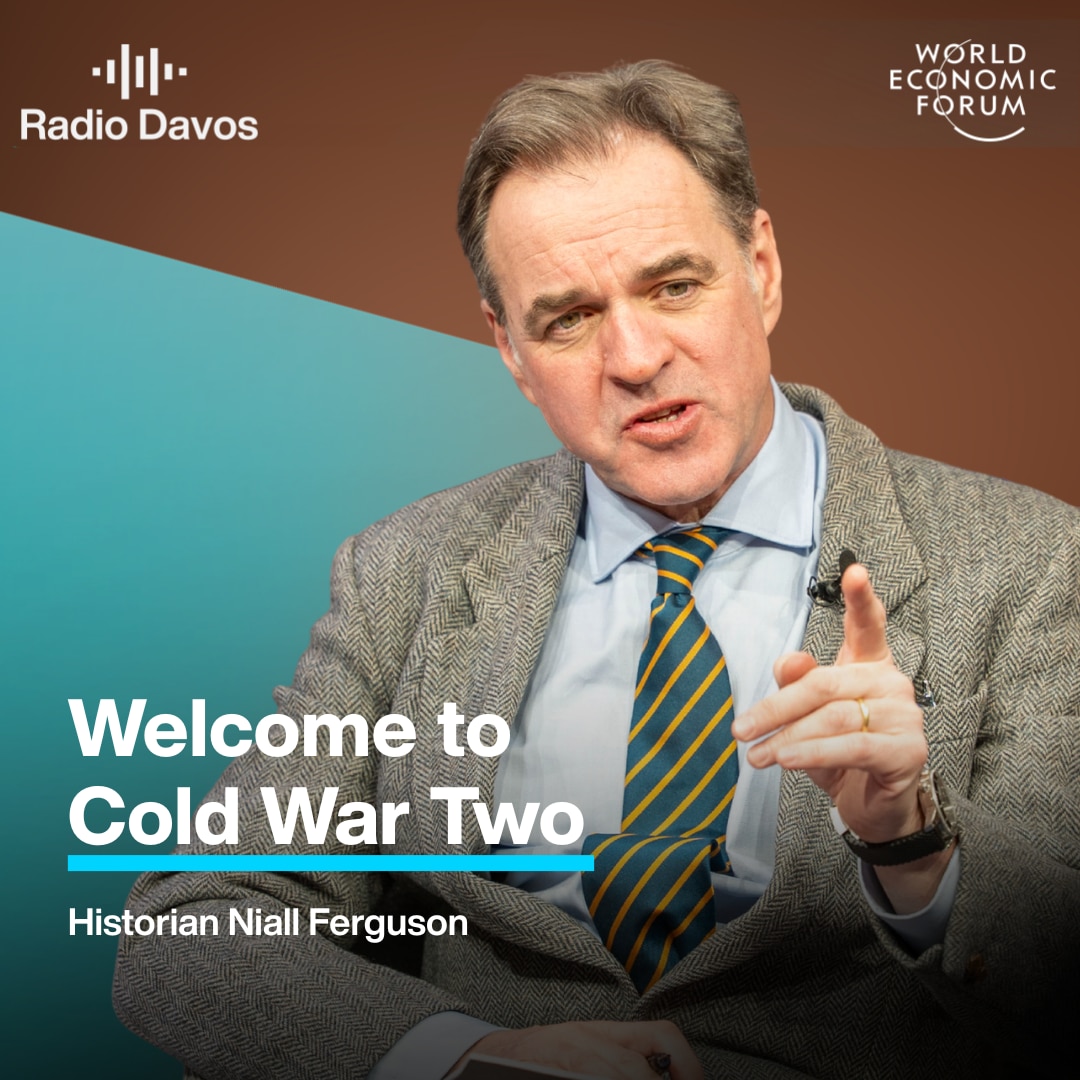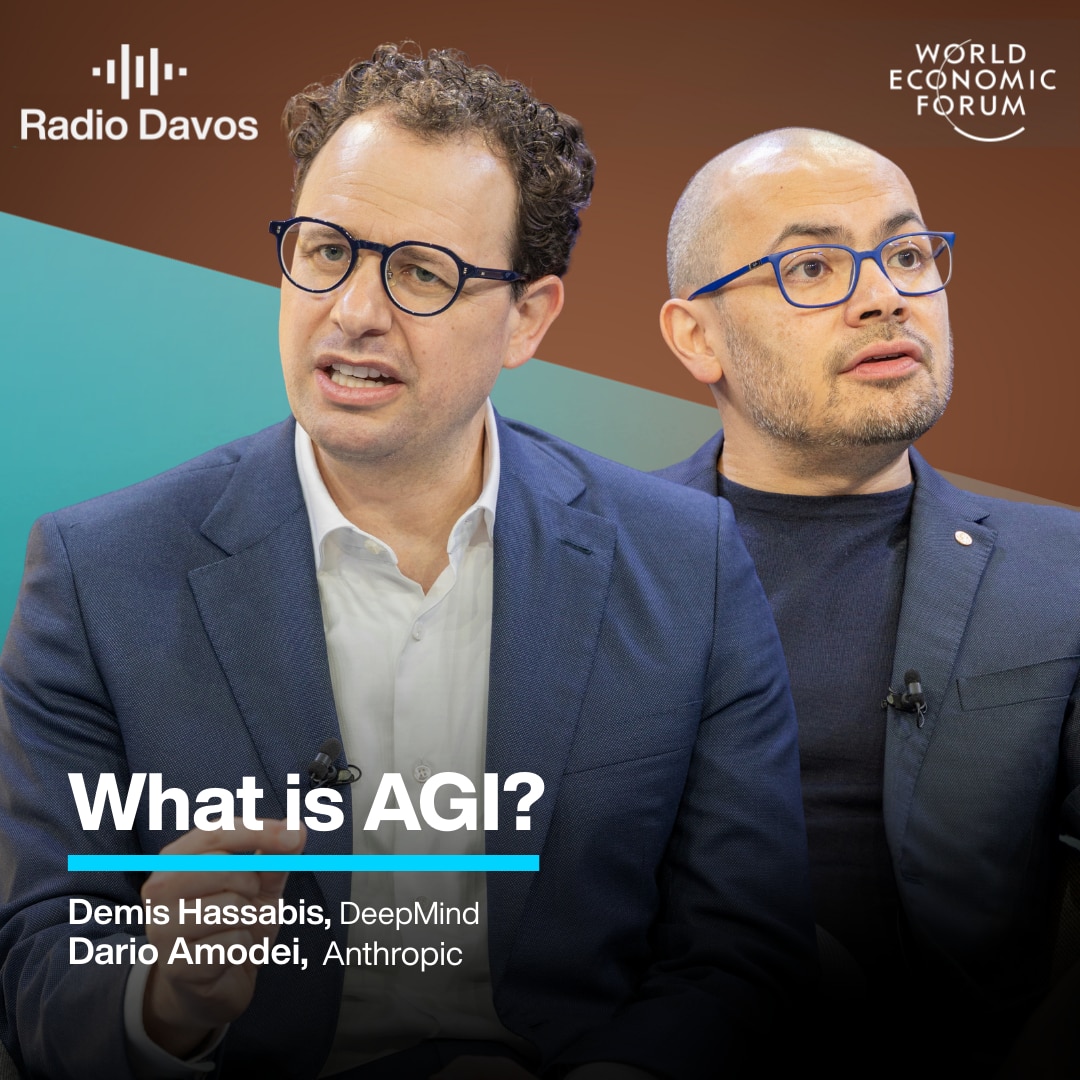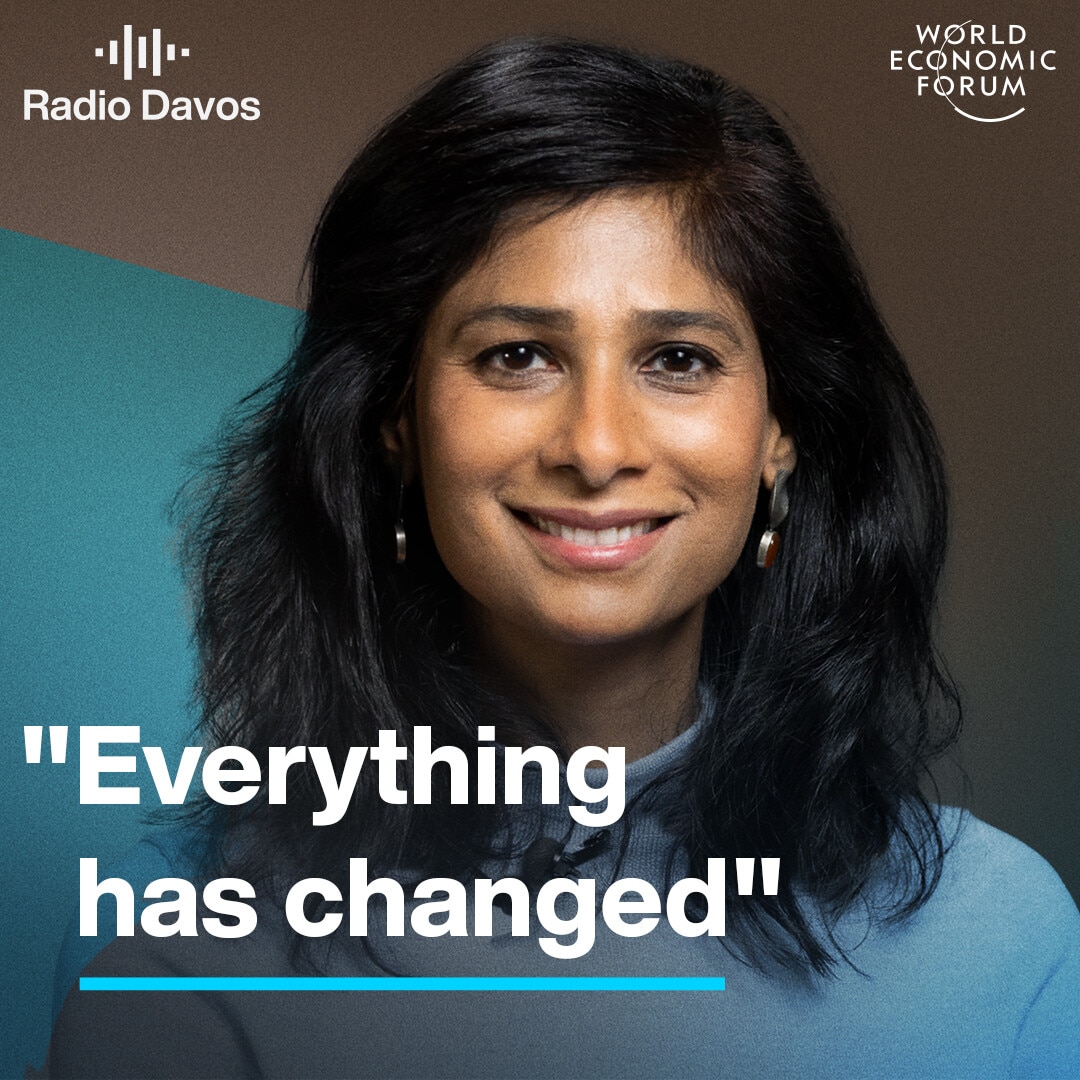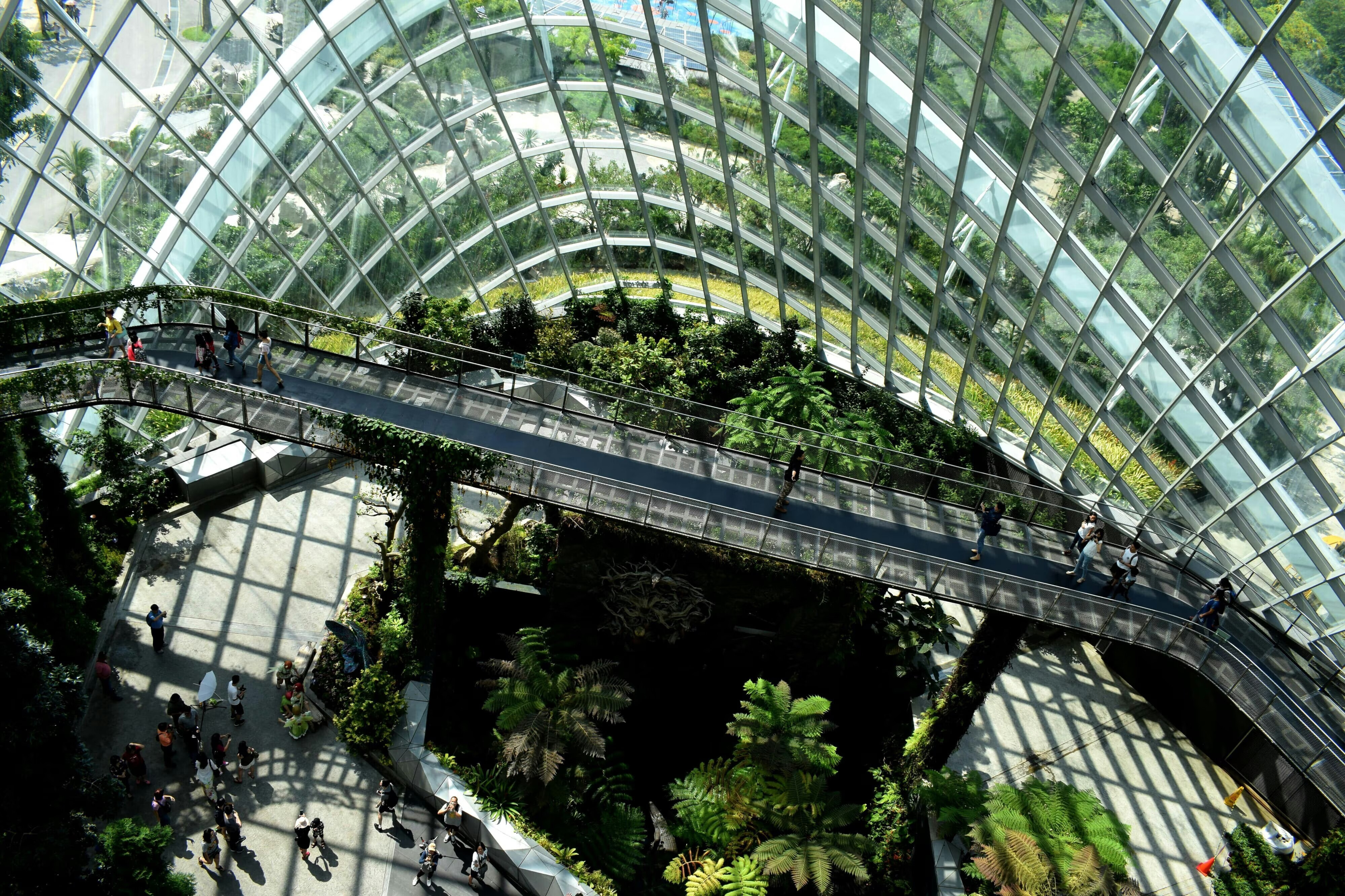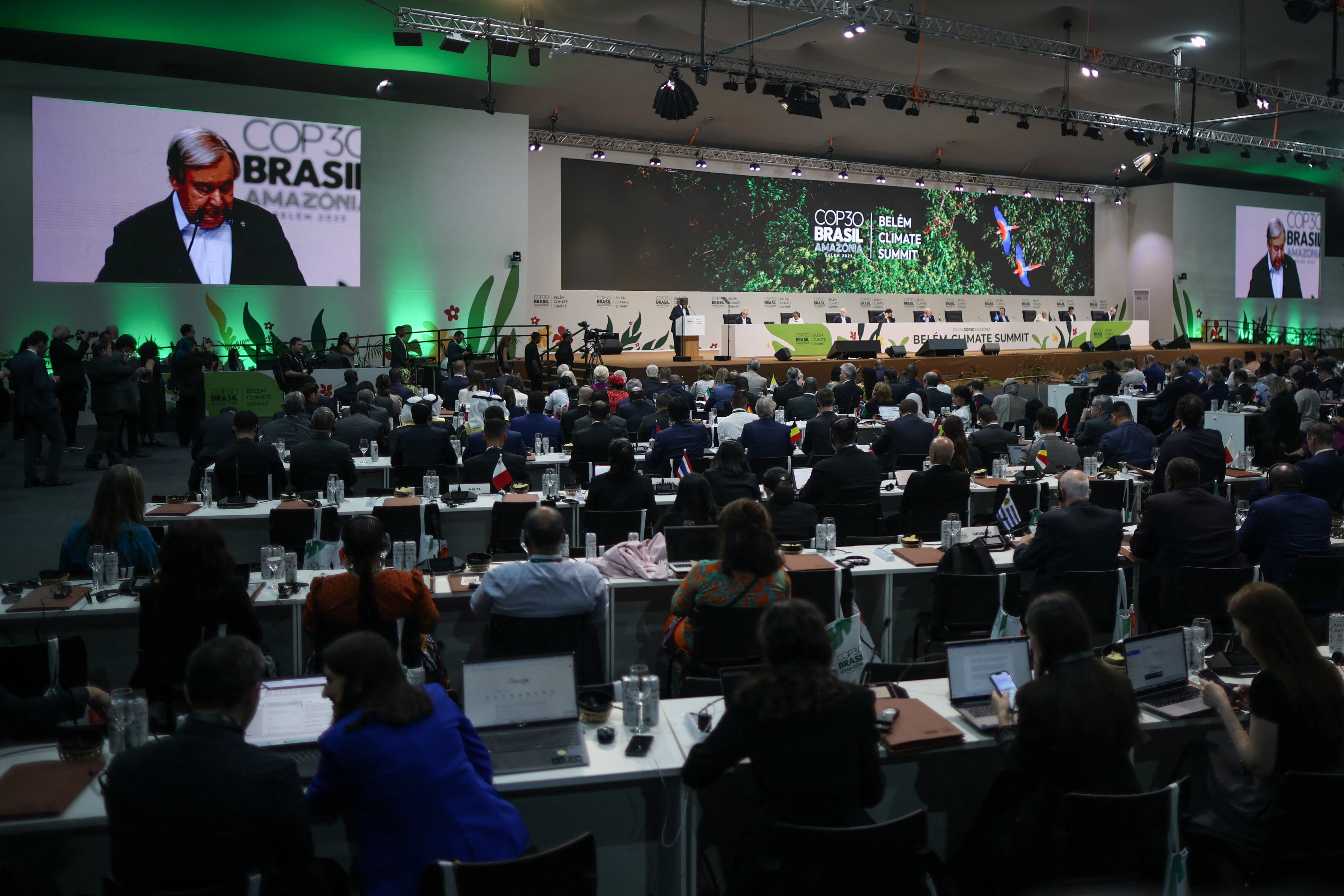How to nudge heavy industry to sustainability: the First Movers Coalition
ポッドキャスト・トランスクリプト
This transcript has been generated using speech recognition software and may contain errors. Please check its accuracy against the audio.
Joe Hicken, Senior Vice President of Business Development and Policy, Sublime Systems: Today's cement manufacture involves a football field length furnace or kiln. And they have to heat this kiln to the temperature of hot lava when it erupts from the earth's crust in a volcano. And that requires a lot of fossil fuel energy
Robin Pomeroy, host, Radio Davos: Welcome to Radio Davos, the podcast from the World Economic Forum that looks at the biggest challenges and how we might solve them.
This week, how can companies that use carbon-intensive products - such as cement - invest in new, cleaner methods of production?
Joe Hicken: It's rare for a cement manufacturer to have a conversation with someone at the other end of the supply chain, the complete opposite end of this supply chain really.
Robin Pomeroy: We hear from a startup making net zero cement, and a multinational company promising to buy what it makes.
Julia Fidler, Head of Materials and Fuels Decarbonisation, Microsoft: The structure of this multi-year contract is really about catalytic change. And so it's really important that they have the consistency and assurance that there's somebody willing to pay the green premium for a period of time that allows it scale.
Robin Pomeroy: These companies met through the First Movers Coalition or FMC. That is helping nudge the market to give new clean technologies a chance to decarbonise heavy industry.
Noam Boussidan, Programme Head, First Movers Coalition: FMC is almost not a climate initiative. It's really an initiative that will help ensure the long-term sustainability, in the business sense of the word, for those industries. It's almost a life and death issue for them.
Robin Pomeroy: Follow Radio Davos wherever you get your podcasts, or visit wef.ch/podcasts.
I’m Robin Pomeroy at the World Economic Forum, and with this look at how the First Movers Coalition is helping heavy industry decarbonise
Noam Boussidan: It's really something more profound and it's really something that is absolutely essential.
Robin Pomeroy: This is Radio Davos.
Welcome to Radio Davos.
We're talking once again about the quest to get humanity to net zero. And there are some industries that produce a lot of greenhouse gases that find it very, very difficult to reduce them.
And someone's going to talk to me about that today. His name is Noam Boussidan. He's programme head of the First Movers Coalition at the World Economic Forum. Noam, how are you?
Noam Boussidan: I'm very well. Thank you. How are you?
Robin Pomeroy: I'm well. Thanks, Noam. Now, let's get into, first, what is the First Movers Coalition?
Noam Boussidan: Thanks a lot. The First Movers Coalition, which we casually call FMC, is an initiative that was born in 2021 at COP26 at a time where climate action was really at its peak and there was a lot of momentum to precisely address some of the issues you just referenced.
Specifically, this is an effort that is geared towards moving so-called hard-to-abate sectors, meaning those industrial sectors where emissions are really the most difficult to reduce, to a place where key technologies will really make a significant difference.
Because one of the key issues that those sectors are facing today precisely that. There are very few mature and widely available technologies that can get them towards reducing their emissions.
This is what FMC does. It aims to send a very strong demand signal to the markets for these so-called deep decarbonization technologies that will help move the needle very significantly by 2030 so that markets are in a position whereby we can start to witness some very significant emissions reductions for those seven industrial hard to obey sectors.
Robin Pomeroy: Remind us what those seven sectors are. I have it down in front of me, if you forget. I just looked it up. Let me test you on it. What are the seven sectors?
Noam Boussidan: So we have two clusters of sectors, if you will. One is around mobility sectors, and there you have aviation, shipping, and trucking. We have a second cluster, which is around materials, and there you have cement and concrete, aluminium and steel. And we have a seventh sector, which is a bit more cross-cutting by nature, and which is specifically focused around CDR, meaning carbon dioxide removal technologies.
Robin Pomeroy: Now these are big industries, some of them, I think cement and concrete, which we're going to talk about. I've got an interview that I did at an event that you held at the World Economic Forum's office a few weeks ago in Geneva about concrete and cement. And I think that sector in itself, because of the chemical reaction that takes place and because of their energy required to produce cement and concretes. Is something like 6-7% of all human-made emissions. Is that right?
Noam Boussidan: That's absolutely right. Look, each and every one of those sectors by itself represents a very significant share of human-made greenhouse gas emissions. This is why an initiative like the First Movers Coalition is actually extremely relevant to making a significant dent in our global emissions trajectory.
Overall, it is estimated that these seven how-to-abate sectors that I referenced earlier, represent close to one-third of global emissions, 30% of global emission give or take.
By the way, this is not the full picture and the full story and we are aware of it. A very important sector, for instance, like the chemical sector and the chemical industry is not today within the scope of FMC, but we are very much looking forward to making sure that we can do that pretty soon as well. And there you also have a very significant portion of human made emissions.
Robin Pomeroy: So there's the challenge. These are products that humanity uses. It's growing the use of these things like aluminium, aviation, aviation fuel, a topic we've touched on in a fairly recent radio Davos, which people should go back and listen to.
Let's talk about how the First Movers Coalition is trying to do this. Because on one hand, you've got, are there technologies that means we can make these things, we can fly planes, we could make cement without greenhouse gas emissions? Well, the answer to that, luckily, is yes, there are technologies either available now or in development.
I think the challenge that you are facing is how do you bring that to scale where you've got massive industries all over the world, they can't all suddenly change from the old-fashioned way of doing things to these new technologies. Some of these new technology might not yet be proven either at a technical or a market level.
As I understand the First Movers Coalition, what you're doing is making a marketplace which will show the companies producing those things. There is a market and you're bringing buyers together with sellers or innovators, companies developing these technologies to say, it is worth investing in this technology because there will be a market.
Have I understood correctly what FMC does?
Noam Boussidan: Absolutely, it's about many of those steps that will get you there because indeed you have blockers all along the way.
And so oftentimes when you have this conversation with very different parts but all interconnected of the value chain, you have pretty much the same kind of feedback that comes back very often, which is we need very clear and strong visibility around who's going to buy our products.
Because if we're going to have that visibility, we will then have the confidence to make sure that we can invest, we can investment scale for the creation of those production plans for additional R&D. And so that is absolutely essential to cover what is usually called or referred to as the green premium.
So that is precisely what FMC does. It brings together buyers who single-handedly on their own are all facing the same issue, which is that in the markets today, when they're going out there, they don't have sufficient traction to significantly impact the offer that is being out there. So they're facing a crunch in terms of availability of supply at scale at commercially available prices and I will add specifically in key regions of the world.
And on the other hand you have the suppliers who you're speaking to and who are telling you well we would love to make those investments and we have some of those technologies that are ready and we are very willing to try and do what's necessary to try and scale the ones that are not yet today. But we're not seeing on the other hand of the market who's going to be able to provide us with the confidence that our investments are not going to go completely bust because we need to have that visibility and the clarity on signal.
Add to that a layer of financial prudence, in particular from the financial sector who are telling you we are again willing and we have a significant amount of capital to deploy but we need to have that clarity on both ends of the spectrum. And the policy makers as well who are in there and who are trying to make their best to try and support the development of that full ecosystem.
So FMC does all of it together. It brings that ecosystem. It focuses specifically on generating that very strong aggregated private sector demand signal that is going to be sent to the market, with a clear focus around the 2030 timeline.
And companies who join the FMC do not claim they just join the FMC; to join the FMC you have to make a sectoral commitment in one of the seven sectors that I highlighted beforehand, so it is a very demanding and very strong commitment that you are making
Robin Pomeroy: What kind of commitment would that be?
Noam Boussidan: Well, if I can think of steel for instance, companies need to commit by 2030 to procuring 10% of the total amount of steel they are buying to be near zero, which is a very significant endeavour to take because near zero steel, according to a number of definitions, and we don't want to get too technical here, is going to be produced through a certain number of technological pathways. And these are precisely the technologies that we're trying to scale. So the market signal, the First Movers Coalition is sending is actually not a direct one on technologies, but it's an indirect one through demand for green products, such as in the example that we have taken, green steel. or in the examples you referenced before, so-called green cement. And that is the case across the seven sectors.
Robin Pomeroy: Noam, I've seen the pendulum swing over the years when it comes to climate action. You mentioned when FMC was launched, you said yourself it was kind of at the height of climate action, I think we could all agree the pendulum's kind of swung away slightly from climate awareness and climate action, certainly the Trump administration has moved the U.S. away from that as it. As happened in his first term. I wonder, does that impact the work you do in any way?
Noam Boussidan: It's absolutely undeniable that there's been a very significant change within the international political context in which we operate.
Specifically linked to the United States government, the First Movers Coalition was actually born in 2021 as a very close partnership, and you could almost say joint venture, between the World Economic Forum and the United States government, and the State Department specifically. And over the years, John Kerry has really been one of the key champions, the main figure of the First Movers Coalition. And this has generated significant and tremendous success for the initiative.
We are very obviously operating today in a different context. We have recognised and we have acknowledged that. But by no means does it equate to the end of the relevance of our efforts.
As a matter of fact, we are still seeing and witnessing very clearly and very strongly from our 100-plus corporate members an intention to not deviate and to not lose track of the very important work that they have engaged upon through the First Movers Coalition.
There are not many initiatives out there that are geared towards creating a strong demand signal to help scale deep decarbonization technologies for key hard to abate industrial sectors.
So FMC is almost not a climate initiative. It's really an initiative that will help ensure the long-term sustainability in the business sense of the world for those industries. It's almost a life and death issue for them. If they don't transform, if they don't adapt, If they don't anticipate what is coming, the way they are making business today is not going to be relevant in the next 5 to 10 years. It's a matter for them of survival. It is not a matter for them of nice to have or showcasing a couple of nice commitments. It's really something more profound and it's really something that is absolutely essential.
Robin Pomeroy: Okay, well, let's listen to that interview now. This was at an event, the FMC Day, I think you called it, at the World Economic Forum's office in Geneva.
I met a buyer and in this case, it was Microsoft. People will have heard of that. This shows you the kind of size of companies we're talking about. It's a company that uses a lot of products. In this case talking about concrete and cement, interestingly. And a seller. A startup that has created out of MIT, so also in the United States, Massachusetts Institute of Technology, a technology for making emissions-free or near-emissions-free cement and concrete. It's called Sublime Systems.
I mean, is that typical of the kind of conversations you're bringing together, these huge, well-known multinationals and maybe these small startups and literally putting them around a table together? Is that what FMC does?
Noam Boussidan: Absolutely. That is really at the heart of what FMC seeks to generate. When your business is around sending a demand signal to the market, you're then hoping that exactly this will happen, which is that there will be someone somewhere who's actually working on one of those breakthrough technologies and who will say, well, actually I can help. I can provide this and you can help me as well because I'm not there yet in terms of scale and I'm facing challenges in terms of the policy environment or regulation that is being applied to me. I'm facing challenges because banks will not necessarily go all the way to support me because they're not seeing what my business model is like.
And so this kind of bringing together, facilitating those connections, which is exactly what happened by the way, as far as Microsoft and Sublime Systems is concerned, whereby they met at a workshop organised in 2024 in the United States, one of our activities called an in-country workshop, where that connection happened and then actually they went - we did not participate in Microsoft talking to Sublime, but we are truly delighted and really energised by the fact that this is real tangible impact that we can trace back to the First Movers Coalition. They met through our platform. They have embarked on a journey together. And today they are in a position to announce what they just did, something very significant that will actually really help move the needle for those markets that FMC is concerned with.
So as far as we're concerned, we're extremely proud and we're extremely happy that this has been able to be catalysed through the First Movers Coalition and we're hoping that many more of those deals would actually happen in the exact same way.
Robin Pomeroy: And we'll be following, I know you're tracking the impact that you're having, maybe we can talk again in a few months time, kind of an update in other sectors as well.
We're going to hear that interview now, but for the moment, Noam Boussidan of the First Movers Coalition at the World Economic Forum, thanks for joining us on Radio Davos.
Noam Boussidan: Thank you so much.
Robin Pomeroy: We're talking about cement and concrete, and I'm joined by two people who've met, one making the product, one buying the product. I'll get them to introduce themselves. Hi Joe, could you introduce yourself?
Joe Hicken: Absolutely, Robin. My name is Joe Hicken. I'm Senior Vice President of Business Development and Policy at a company called Sublime Systems.
Robin Pomeroy: What is Sublime Systems?
Joe Hicken: Sublime Systems is a spin-out from MIT. We're about five years old. And we are commercialising a technology to make cement differently.
Robin Pomeroy: My other guest here is Julia. Hi, Julia, could you introduce yourself?
Julia Fidler: Sure, I'm Julia Fidler, I am with Microsoft. I'm part of the carbon reduction team and I support on fuel and material decarbonization.
Robin Pomeroy: Okay, so what brought the two of you together? Maybe, Julia, I'll start with you. You're trying to decarbonize the work of Microsoft. When you think, when I think of that, I would think of data centres, perhaps. Obviously, all the usual logistical things that any company has. But here today, we're talking about concrete and cement. Why is that an important thing for Microsoft?
Julia Fidler: Microsoft has a commitment to be carbon negative by 2030. To achieve that commitment, we need to go deep into our supply chain and look at all of the services and the goods that we purchase, which we don't today have direct control over. That's one of the key reasons why cement and concrete is critical to Microsoft in achieving that 2030 commitment.
We started, of course, a number of years before that commitment to be reducing our energy consumption directly.
We have now moved into the space of indirect emissions, sometimes known as Scope 3 emissions.
And those are complex and within those we include construction, we include services, we include our corporate air travel, there's a whole variety of things that we don't have direct control over.
And so as we built maturity and we worked through the challenges that we'll face to achieve the 2030 ambition, we realised quite quickly that there are some key areas that will be harder to address than others and quite quickly you get to topics such as cement, concrete, steel, aviation, topics that some will be familiar with, but within those we also identified that we're not directly buying those materials, we're often doing it through third parties, so general contractors, for example, in the construction space, and you're right, data centres obviously is one of the significant areas of growth for Microsoft, but also within our campuses you know it might be putting down a sidewalk, it might be addressing where cables are going in, so a whole variety of different areas that these products will need to be used.
Robin Pomeroy: And you've identified cement and concrete. They're a heavily emitting product, as well as something we use a lot of. And so you went out to look for a company that could make lower greenhouse gas emitting cement and concrete.
Julia Fidler: Exactly, so we really need the deeply decarbonised solutions to be able to meet our commitments.
And so we started to identify which solutions might be available by 2030 and what needs to be true for them to be successful, to be able to be deployed at scale.
And so Microsoft is working together with our general contractors and with other supply chain partners to directly procure low-carbon materials.
But we also saw an opportunity to use a mechanism that we've been working on for a number of years in another sector, aviation specifically, where we've using this description of book and claim to allow Microsoft to increase ambition and to fund the green premium, so the additional cost of some of these new novel materials and fuels, and to be able to apply that same approach to other categories such as cement and concrete.
And so we were looking for companies that both had the decarbonization potential, had challenges to scale, so where was there a need for us to support in this way, and also had an interest in partnering with a company like Microsoft. And so we're open to this concept. How could we develop it together? And that's how we came to find Sublime.
Robin Pomeroy: OK, so Sublime Systems, then, Joe, is a company that has worked out how to do this. Just tell us what, something about your product. I mean, we know that cement traditionally takes a lot of takes a lot of energy and the process involved emits a lot of greenhouse gases. So what's what's different about what you do?
Joe Hicken: Yes, so Robin, today's cement manufacture involves a football field length furnace or kiln that's about as big as a school bus, you can drive a school bus through it. And they have to heat this kiln to the temperature of hot lava when it erupts from the earth's crust in a volcano. And that requires a lot of fossil fuel energy to heat the kiln to that temperature.
It also uses a raw material called limestone, which actually has CO2 geologically sequestered in the material itself. And so when it bakes, actually half of the raw material turns into CO2 that vents off with the production process.
And so Sublime's technology uses an all-electric process that dissolves feedstock at ambient temperatures. And the feedstock that we use is non-carbonate mineral or other industrial wastes that do not have CO2 embedded in them. And so the technology fundamentally has a path towards emissions reductions greater than 90% compared to today's cement manufacturing process.
Robin Pomeroy: So shouldn't we all just switch straight over to that? Why do you need this kind of agreement you've achieved with Microsoft?
Joe Hicken: Yes, so the challenge is actually much more significant than the technology. It's actually a logistics challenge. It's a construction ecosystem adoption challenge. It's capital intensive transition.
And so the reason that this advanced market commitment is so meaningful for scaling technologies like Sublime is that it is an important signal to the market that these technologies are worthy of investment to get to scale.
The reason that the First Movers Coalition and the World Economic Forum's initiative to structure demand in such a way that quantifies and reduces the merchant risk for the market, for traditional project finance and financiers to invest in the capital necessary to get these types of technologies at scale producing for commodity production for just the regular the regular construction ecosystem.
Robin Pomeroy: So you say it came out of MIT. For a long time it was experimental, am I right? And now you're saying we can actually do this, but we need this capital input because we have to build a plant or plants to make this industrial.
Joe Hicken: That's right. So the original technology was invented out of MIT. And now we have a functioning pilot plant in Somerville, Massachusetts that operates at the tonne scale. We deploy enough cement to fill one or two concrete trucks worth of concrete with our cement, deploying in the real world, allowing end users like the general contractors, the subcontractors that actually place and finish the material, give it its, you know, nice finish, this aesthetic finish. And the concrete folks that actually mix the cement powder with the rock and the water to deliver the concrete to the job site, enabling them to have real hands-on experience with the material.
At the end of the day, their reputation's on the line. They need to build an infrastructure that works and that is safe. All those partners have a critical role to play.
And as Julia was mentioning earlier it's rare for a cement manufacturer to have a conversation with someone at the other end of the supply chain, the complete opposite end of this supply chain really.
And that's why this partnership or this relationship is so meaningful, is that Microsoft is leading the way and driving the supply chains and really driving solutions that it wants for the future of its construction and build out.
Robin Pomeroy: Yeah, and you are at the opposite ends of a very, very long supply chain, and Julia was saying you'd be using contractors and subcontractors, and eventually they would be buying their raw materials from a provider. I believe you're using something called environmental attribute certificates. Is that right?
Julia Fidler: That's right.
Robin Pomeroy: Could you tell us how that works?
Julia Fidler: So the Environmental Attribute Certificate is a description of how we can essentially separate the physical material of the cement from the environmental benefit of an organisation such as Sublime and that we can traceably be able to report what the emissions are and then to claim that within Microsoft's inventory and by funding the green premium and by managing the documentation around that and ensuring that there's an integrity and a traceability element to it, then we can create a certificate.
And that's a mechanism that allows us to do forward commitment. So important for a market that's typically reliant on spot procurement. We can go above and beyond that and say for a period of a multiple number of years, we can commit that we'll take the environmental attribute, provide that revenue certainty model. And also for Microsoft, that allows to have a flexible way of being able to secure a lower carbon benefit, but where we may not geographically be able to do that across all of the facilities that Microsoft may be working on.
Robin Pomeroy: Can you give us some idea of what the deal is you've met between each other?
Julia Fidler: We have a six to nine year contract. and it spans multiple facilities for Sublime. So it starts with the first commercial facility, which will be online before 2030 and then allows it to evolve.
So the funding element is really important. The structure of this multi-year contract is really about catalytic change. And so it's really important that they have the consistency and assurance that there's somebody willing to pay the green premium for a period of time that allows it scale.
The idea being that we won't eventually need this type of approach, but for now, it's really crucial that buyers such as Microsoft have a direct way of being able to ensure these facilities come online.
Robin Pomeroy: You eventually won't need this kind of approach, because that catalytic action has happened, and you'll just be able to go in the normal market and buy, I want this product with these specifications.
Julia Fidler: Exactly. So when we look at these types of novel contract, one of the things that we look for is the future scalability. So is there a path towards it being at price parity, essentially the same price?
And that's a complex topic, but ideally that's what we're looking to achieve in that there's a period of time before that's feasible where additional funding is required.
Robin Pomeroy: I'm just trying to get my head around it in the real world. Let's say you're building a building, whatever it is, with cement, but it's not anywhere near Joe's factory. You're buying the cement there, you're not necessarily using it to build this building. You're buying some other cement to build that building. What happens to the cement that you've already bought over here that you're not using in that building?
Julia Fidler: So the cement that Sublime will produce will be used in another facility. And the idea of the documentation, the reason I would describe an EAC as a set of documentation, is that you need to have traceability that the product is actually displacing something which is full carbon, let's say, high carbon. And so that producer that's going to use Sublime's product will report the emissions associated with traditional cement. We are the only party, then, that would have the opportunity as an end consumer to report the lower emissions. But the documentation will allow us to know exactly what the emissions were of the sublime product. And we would use a benchmark of traditional cement that it's displacing.
Robin Pomeroy: And that's important for your own monitoring of emissions. Does it also come to a point where you're disclosing that? Are you trading emissions anywhere or is this something that might happen in the future?
Julia Fidler: We're not trading emissions and it's really important to differentiate what we describe here as an environmental attribute certificate where you're really protecting the attribute of the environmental value versus for example a credit, and credits obviously have a variety of different values to them, but it's a solution that's outside of your supply chain typically. So this is what is frequently described as an in-sector or sometimes even in-setting, where we're really trying as closely as possible to match it to our supply chain, but it's not going to be geographically feasible for us to do that at the level of ambition that we have, at the scale that we have.
And so this type of solution allows us to solve the problem for the industry, but also solve some of the challenges that Microsoft has in being able to identify sufficient low carbon solutions at the scale that need.
It's really important that when we talk about the purpose of environmental attributes certificates, they're only one part of the jigsaw that we need to be able to support decarbonization at scale. And it's really to demonstrate that physical procurement is always going to be a priority. And so one of the things within the contract we have with Sublime is that if and when we get to a point that the products available that Microsoft can use it in our supply chain, we will prioritise that. It'll get converted from the certificate into the physical product.
And so when we speak about environmental attribute certificates, when they're in their infancy, it's a new concept to many people. Of course, creativity is important, but also establishing some core principles around what's appropriate, how these should be used, is really critical.
Robin Pomeroy: So how important is it for a kind of a startup company? You've got this thing, you believe it really works. Clearly you've got a client here who believes it will really work. But you need that investment. You're not able to start selling the product until you've built the plant. You need a huge capital investment. I mean, can you give us some idea of how important that is to you?
Joe Hicken: Yes, Robin, that's the central issue, is demonstrating that demand and quantifying that demand through bankable off-take transactions. This transaction involves over 622,000 tonnes of cement, enough cement to build roughly 30 or so stadiums. And that sort of sizable offtake transaction has caught the attention of folks in the construction ecosystem realising that the demand is there.
The book and claim mechanism also allows for us to concentrate demand through multiple buyers that aren't geographically proximal to one specific factory.
So if you can imagine, it doesn't make sense for a company like ours to ship cement all over the world to all of the leading customers and visionary customers that want to decarbonize their supply chains. It allows, this book and claim mechanism, allows us to deliver the value directly to the leading companies looking to drive change in their construction embodied carbon.
And so for a company like Sublime's, this transaction and others that will follow, are the type of signal that allow us to unlock capital to build the factories for the million tonne plus scale production that we hope to build in short order.
Robin Pomeroy: And where do you see this industry in 10, 15, 20 years time? Because there are a number of options. I guess technologies will develop. A decarbonized cement and concrete sector, what would it look like?
Joe Hicken: I mean, I think kudos actually goes to the cement industry long before Sublime Systems was a twinkle in anyone's eye from a technology standpoint.
They were the first industry to look towards establishing net zero goals. And they recognised that the production process had an achilles heel. It accounts for about 8% of the globe's CO2 emissions.
We've been lucky to have the major cement manufacturers very interested in decarbonizing their production processes, whatever it takes.
Last summer, two of the world's largest cement manufacturers, Holcim and CRH, invested in Sublime Systems. You know, invested in sublime systems, actually entered into an advanced off-take of some of our first commercial facilities' outputs and are interested in exploring using our technology for their own production processes.
At the end of the day, the most efficient technology is the one that wins. We're really proud of our all-electric, electrochemical manufacturing process as the most efficient way to make the same material that produces our roads and schools and hospitals. But it's actually helpful to have a number of other technologies emerging in the space. We're not running at this alone.
And so ideally the market has choice. We're really excited about our product. But I think that it's really important to know that there are a number of other technologies that are running at this challenge. It's really actually a good opportunity to solve.
Robin Pomeroy: Just ask each of you as well, finally, the First Movers Coalition, you're here, I'm talking to you in the World Economic Forum's offices in Geneva. There's a meeting of people associated with the FMC from industry buyers and sellers of low-carbon, hard-to-abate products like cement and concrete. How important is it to have a forum where you can actually meet face-to face opposite ends of this supply chain? Maybe I can ask each of you?
Julia Fidler: It's incredibly important. I mean, we can point back to one previous FMC meeting that enabled us to really establish trust and to have a shared understanding of what we were trying to achieve. It wasn't the first time that we'd spoken about this concept, but it was really pivotal that we had a closed environment to be able to share concerns, to be to talk about ideas.
And what FMC creates here is that trusted environment, where you know people have an understanding of what we're trying to address, the challenge that we're trying to face. So you've removed some of those initial barriers and it means then you have this space to really be able to ideate and to be able explore feasible solutions, to be to look what needs to happen to overcome some of these challenges.
Joe Hicken: Yes, we sat down for lunch and kind of aligned on first principles, that sort of human connection and space, you know, aligned with other lessons learned elsewhere in the ecosystem are really critical for or the creation or really the invention of a first-of-the-kind transaction in a novel space, borrowing from insights and wisdom from other transactions.
We're actually really lucky to have Julia's expertise having facilitated transactions in the sustainable aviation fuel spaces, bringing similar constructs to bear. Instead of swapping out aviation fuel for sustainable aviation fuel, we're swapping cement for electrochemical clean cement.
And that initial lunch, you know, led to hundreds of hours of Zoom meetings to bring this to an actual tangible transaction, which, you know, when you think about accelerating the speed of these conversations, getting the right people in the room, thinking differently is a really important part of that.
Robin Pomeroy: Joe Hicken, Senior Vice President of Business Development and Policy at Sublime Systems speaking to me along with Julia Fidler, Head of Materials and Fuels Decarbonisation at Microsoft. You also heard Noam Boussidan, Programme Head of the First Movers Coalition.
You can find out lots more about the First Movers Coalition on the Forum’s website - links in the show notes.
Please follow Radio Davos wherever you get your podcasts and please leave us a rating or review. And do check out our sister podcasts, Meet the Leader and Agenda Dialogues.
This episode of Radio Davos was written and presented by me, Robin Pomeroy. It was editing by me and Jere Johansson. Studio production was by Taz Kelleher.
Radio Davos will be back next week, but for now thanks to you for listening and goodbye.
Scroll down for full podcast transcript - click the ‘Show more’ arrow
Around the world, people are developing low-emissions technologies - but they can only succeed if there is market demand.
In this episode, we hear how the First Movers Coalition helps create that market by getting big companies to invest in emerging technologies that aim to de-carbonise the 'hard to abate' sectors. And we meet the buyer and seller of low-emissions cement doing just that.
トピック:
気候変動対策その他のエピソード:
「フォーラム・ストーリー」ニュースレター ウィークリー
世界の課題を読み解くインサイトと分析を、毎週配信。
